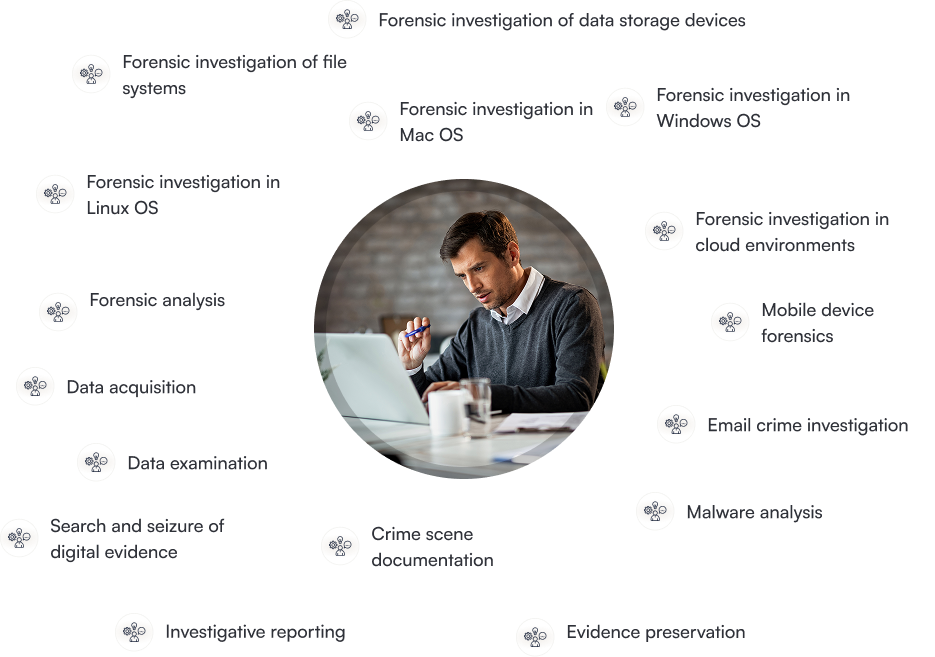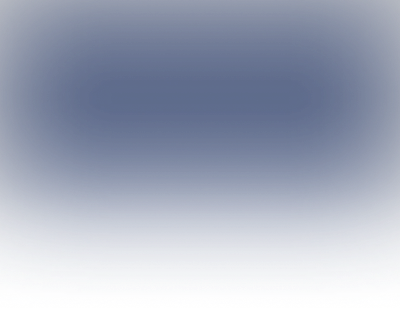INVESTIGATING NETWORK INTRUSIONS AND COMPUTER FORENSICS
10 Weeks
Duration
Online
Mode of Study
Computer Hacking Forensic Investigator (CHFI)
Certification
$465
Cost Per Credit Hour
Course Overview
This course takes you deep into the intriguing world of computer forensics and equips you with the skills to conduct successful cyber investigations. You’ll bring cyber-criminals to justice by tracing, acquiring, preserving, analyzing, documenting, and securely handling digital evidence to maintain integrity throughout the investigative process.
Your career prospects and earning potential as a computer forensics investigator will be enhanced by upgrading your know-how of the latest digital forensic investigation trends, tools, and techniques. You’ll also boost your professional credibility with a valuable cybersecurity certification – Computer Hacking Forensic Investigator (CHFI).


Admission Inquiry
"*" indicates required fields
Highlights of This Course

Cutting-Edge Courseware
10 modules featuring immersive video lectures and digital books for an in-depth understanding of every topic.

Virtual Labs
Simulate real-world scenarios for hands-on practice with the latest cybersecurity tools.

Quizzes
Engaging quizzes after each module that measure and reinforce your knowledge of the topics covered.

Discussions
Interactive discussion boards where you exchange ideas and views on the course topics with your peers and professors.

Essential Tools
Software tools that enhance your learning experience, such as Grammarly.

24x7 Online Library
Round-the-clock online library with an expansive collection of free-to-use learning resources.

Cybersecurity Certification
Includes EC-Council's industry-approved Computer Hacking Forensic Investigator (CHFI) certification.
Why Pursue a Career in Digital Forensics?
Market Growth
Soaring Demand
The global demand for digital forensics is growing at a CAGR of approximately 13.4%, corresponding with the rising demand for professionals specializing in digital forensics worldwide. (Source: The Business Research Company)
Earning Potential
Earning Potential
Weekly Modules
Week-1Module 1 – The Significance of Computer Forensics Today
In this module, you will discuss the modern-day role of computer forensics in investigating and prosecuting cybercriminals. Forensic investigators are trained professionals who extract, analyze/investigate, and report crimes that either target technology or use it as a tool to commit a crime. You will also understand the challenges and issues investigators commonly face while conducting forensic investigations.
Week-2Module 2 – Storage Devices and File Systems in Digital Forensics
Week-3Module 3 – Data Acquisition Fundamentals in Digital Forensics
In this module, you will examine the role of digital forensics in an organization’s security posture and the importance of data analysis in digital forensic investigations. You will also evaluate various forms of digital forensics, explore the tools and methodologies utilized for validating data, and conduct a successful digital forensics investigation of your own.
Week-4Module 4 – Windows Operating Systems Forensics
In this module, you will learn how to collect and examine forensic evidence related to cybercrime incidents on Windows machines.
Week-5Module 5 – Forensic Analysis Across Various Platforms: Linux, MacOS, Web Applications, & Network Security
This module is about detecting and investigating attacks on web applications. Web applications allow users to access resources through client-side programs like web browsers. There are huge implications for organizations if web applications contain vulnerabilities that allow cyber criminals to launch application-specific attacks such as SQL Injection, cross-site scripting, local file inclusion (LFI), command injection, etc.
Week-6Module 6 – Unveiling the Dark Web
In this module, you will learn that, in certain instances, databases may contain vulnerabilities that allow attackers to manipulate the contents of the database. You will develop a sound knowledge of database servers and cloud forensics to examine log files and determine the cause of the attack.
Week-7Module 7 – Forensic Investigation in Cloud Environments and Database Security
This module examines the significance of database forensics and evaluates techniques for performing MSSQL forensics. You will explore fundamental cloud computing concepts and forensics and construct a plan to investigate security incidents in AWS and Microsoft Azure cloud platforms.
Week-8Module 8 – Email Crimes and Forensics
Emails have become a powerful tool for cybercriminals to spread malicious messages and perform illegal activities. You will learn how to investigate email crimes by adhering to the steps taken against email crimes under U.S. law.
Week-9Module 9 – Malware Analysis and Forensics
This module explores various malware attacks, common techniques used by attackers, and malware behaviors, giving you a solid base of expertise to identify and analyze malware while conducting digital forensic investigations.
Week-10Module 10 – Foundation of Mobile Device Forensics
This module shows you how to track malicious cyber-attacks and cybercrimes that occur on or done through mobile devices.
What You Will Learn

- The role of digital forensics in an organization’s security posture
- The role of data analysis in a digital forensic investigation
- Various forms of digital forensics
- How to leverage the right tools and methodologies for validating data
- How to conduct a thorough digital forensics investigation
- The role of digital forensics in malware analysis
- Secrets of the dark web
- Data acquisition for forensic investigations
Virtual Lab Exercises

Get hands-on practice with state-of-the-art cybersecurity tools in simulations that mirror real-world scenarios with this CHFI certification course. The virtual lab exercises included in this computer forensics certification course cover computer forensics disciplines like computer forensics investigation processes, hard disks and file systems, data acquisition and duplication, Windows forensics, network forensics, mobile forensics, email crime investigation, and much more.
Skills You Will Gain


- Forensic investigation of data storage devices
- Forensic investigation of file systems
- Forensic investigation in Windows OS
- Forensic investigation in Mac OS
- Forensic investigation in Linux OS
- Forensic investigation in cloud environments
- Mobile device forensics
- Email crime investigation
- Malware analysis
- Forensic analysis
- Crime scene documentation
- Search and seizure of digital evidence
- Evidence preservation
- Data acquisition
- Data examination
- Investigative reporting
Jobs You Can Prepare For
Digital Forensics Analyst
Computer Forensic Analyst/Specialist/Technician
Computer Forensic Investigator
Cybercrime Investigator
Computer Crime Investigator
Cyber Defense Forensics Analyst
Law Enforcement/Counterintelligence Forensics Analyst
Data Forensics Investigator
Digital Crime Specialist
Computer Security Forensic Investigator
Network/Technology Forensic Analyst
Digital Forensics and Incident Response Engineer
Forensic Imaging Specialist
IT Security Specialist
… And Many More!
Total Course Fee
$1,395
- Cost Per Credit Hour: $465
- Technology Fee Per Term: $50
- Transcript Fee: $10 (plus shipping, if international)

Admission Criteria
- You must be aged 18 years or older.
- You must have a high school diploma (or equivalent), college degree, or relevant certification.
How to Apply
Step 01 :
Fill out the NDS application form and submit it to our Enrollment Advisor.
Step 02 :
Send us a scanned copy of your official government identification and documents showing proof of education.
Step 03 :
Pay the one-time $100 application fee.
Voices of Success: Hear from Our Alumni
Here’s what our students say about this computer forensics certification course and how it helped advance their cybersecurity careers.

Frequently Asked Questions
What is the CHFI certification?
The Computer Hacking Forensic Investigator (CHFI) certification is an industry-aligned cyber security certification designed to give you the knowledge and skills to conduct effective digital forensics investigations. It covers the fundamentals of digital forensics, including identifying, preserving, analyzing, and documenting digital evidence. You’ll learn various forensic investigation techniques and how to use advanced digital forensic tools.
What is the difference between CEH and CHFI certifications?
As mentioned above, the Computer Hacking Forensic Investigator (CHFI) certification caters to the cyber security specialization of digital forensics, offering a comprehensive study of crucial digital forensics aspects. On the other hand, the Certified Ethical Hacker (C|EH) certification focuses on teaching you the skills and knowledge needed to become an ethical hacking expert. While these disciplines are vastly different, getting certified in both helps you become a more well-rounded cyber security professional.
What is the passing score for the CHFI exam?
You must score between 60% and 85% to pass the Computer Hacking Forensic Investigator (CHFI) exam.
